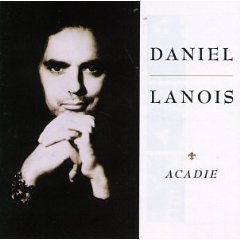
It’s barely gone September as I write this, but already in the place where I live the nights are growing cold. The sun, which all summer long took its sweet time to slide away behind the hills at the close of day, drops now like a quarter into a jukebox. Autumn is not here yet, but it’s close enough that it’s time to think about taking the boots and the barn-coat out of storage. It’s time to think about building some cold frames and covering the garden. It’s time again to play Acadie.
 Marking Daniel Lanois‘s recorded debut as a singer-songwriter after serving production duties on some of the biggest records of the ’80s, Acadie was largely unencumbered with the weight of expectation. Oh, it was a given that the thing would sound great, would be charged with the same blend of ethereal atmosphere and smoky groove that characterized Lanois’s work with U2, the Neville Brothers, Robbie Robertson, Peter Gabriel, and Bob Dylan — projects that saw Lanois becoming, in effect, a member of the band. But as anyone who ever paid full price for a Davitt Sigerson album will tell you, it’s no good being the name above the title if you haven’t got the songs to back it up. And it’s the songs that make Acadie such an endearing (and enduring) record.
Marking Daniel Lanois‘s recorded debut as a singer-songwriter after serving production duties on some of the biggest records of the ’80s, Acadie was largely unencumbered with the weight of expectation. Oh, it was a given that the thing would sound great, would be charged with the same blend of ethereal atmosphere and smoky groove that characterized Lanois’s work with U2, the Neville Brothers, Robbie Robertson, Peter Gabriel, and Bob Dylan — projects that saw Lanois becoming, in effect, a member of the band. But as anyone who ever paid full price for a Davitt Sigerson album will tell you, it’s no good being the name above the title if you haven’t got the songs to back it up. And it’s the songs that make Acadie such an endearing (and enduring) record.
As a songwriter, Lanois forgoes both the anthemnal gestures of U2 and the carnival funk of the Neville Brothers, pitching Acadie to a very human scale. Listen to “O Marie” (download) — just two close-miked acoustic guitars, plenty of natural room sound, and a soft, sleepy baritone; that’s all there is to it — but it manages to sound massive and intimate all at once, a universal hard-luck story made fresh and specific by the language and the details.
Those images recur throughout the album — of working-class French-Canadians, economically displaced, eking it out in the city while pining for the beloved countryside now lost to them, the “Arcadia“ of the title. Migration, yearning, loss; the passing of time, keenly felt. This is what autumn is all about.
Acadie has a large roster of guest musicians, and Lanois deploys them discreetly, in service to the songs, giving each a distinctive sonic character while sustaining the overall mood. “Still Water” (download) features U2’s rhythm section at their most understated and lyrical, and subtle, almost subliminal keyboards from Brian Eno. Aaron Neville’s unmistakable voice comes in as a counterpoint on a spacey, album-closing version of “Amazing Grace,” brimming with stately melancholy; but he sounds a celebratory note, as well, on “The Maker” (download), which turns a New Orleans groove inside out and reassembles it into a plaintive modern hymn.
Then there is Lanois’s own voice; not just his singing — so conversational, so present, slipping freely between English and Quebecois French within a single line, with the shifting of a thought — but the voice of his lyrics. The words are plain, but there’s an air of mystery, like we’re hearing only snatches of a long ongoing conversation. He never overreaches, but the images are full of emotion. Lanois always resists the urge to tell us too much. It’s oddly reminiscent of John Cale‘s writing circa Paris 1919 — he implies a wide screen, but gives us only sketchy corners of the picture.
And it keeps me coming back, year after year, when I need a jacket in the morning and a walk with the dog leaves my shoes soaked and chilly. If a strange vignette like “Silium’s Hill” or “St. Ann’s Gold” (download) moves me, leaves me spooked or wistful or exalted, maybe I couldn’t tell you why. Or maybe it’s the same feeling I get when I see a flock of geese, their V-shape tangled in the turning of their course, cutting some cryptic rune across a cold and brilliant sky. It’s the feeling that signals are going out somewhere, for those who can hear them; a time for goodbyes, for journeys and the shifting o0f the seasons, when home is a memory of lighted windows and soup on the stove, a fire in the hearth and a gentle voice and a naive melody in a corner of the kitchen, murmuring low, just there, at the edge of hearing.
(Note: Lanois has reissued Acadie under his own Red Floor Records imprint, adding six new tracks and a 32-page booklet of “photographs and new inscriptions.” Order it here. —Ed.)

![Reblog this post [with Zemanta]](http://img.zemanta.com/reblog_e.png?x-id=288492f2-d5d2-4e3b-b4fe-1a3a45f3c747)



Comments